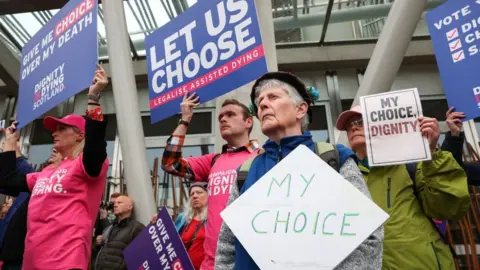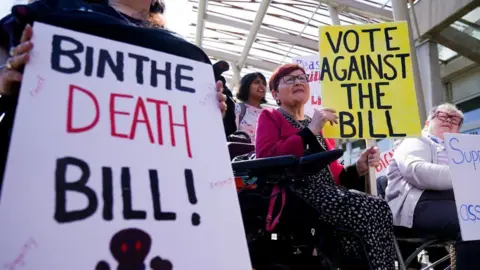How could the assisted dying law work in Scotland?
 Getty Images
Getty ImagesAssisted dying is a step closer to being legalised in Scotland following a landmark vote at Holyrood.
Parliamentarians backed the general principles of a bill brought by Liberal Democrat MSP Liam McArthur following a highly emotional debate.
It would still need to pass two further stages of parliamentary scrutiny to become law.
But the proposals submitted to parliament set out how the law could operate north of the border.
The bill will face further scrutiny from MSPs at stage two, where they could propose major amendments, before a vote on the final draft at stage three.
This process is expected to take several months, with a Holyrood election next May a fixed deadline by which the bill would need to be passed.
A bill to legalise assisted dying in England and Wales passed its first stage at Westminster in November - though there are some key differences with the Scottish proposals.
The Assisted Dying for Terminally Ill Adults (Scotland) Bill says that eligible applicants must be:
- aged 16 or over - though McArthur has promised to raise this to 18
- resident in Scotland for at least 12 months
- registered with a GP in Scotland
- terminally ill
- deemed to have the mental capacity to make the request
To have capacity, the bill says a person applying for assisted death must be capable of understanding information and advice about the process.
They must also be able to make, communicate, understand and remember their decision.
People suffering from a mental disorder which might affect the making of the request would not be allowed to proceed.
The definition of capacity is a key area of difference from the UK bill, which leans on the typical approach in law that a person is assumed to have capacity unless shown otherwise.
Which approach is more suitable to assisted dying legislation is a matter for debate.
 PA Media
PA MediaUnder the Holyrood bill, a person wishing to end their life would begin by signing an initial declaration.
Two medics would then check whether the person is eligible and assess whether they are being pressured or coerced.
That would be followed a 14-day period of reflection. In cases where the patient was expected to die of their illness before then, the period could be shortened to as little as 48 hours.
If they want to continue, the person would make a second declaration.
At this point a medical practitioner or authorised health professional would give them an "approved substance" to be used to end their own life.
The specific substance is yet to be agreed, but the proposals say it must be self-administered.
The legislation would allow for a proxy to sign a declaration for those who are physically unable to do so.
Unlike the UK bill, the Holyrood one does not say whether a third party could help someone overcome physical impairments that prevent them from taking the substance to end their life.
The Scottish bill includes a conscientious objection provision, allowing medical professionals to opt-out of the process.
This differs to the "opt-in" UK bill, which says there is no duty for healthcare professionals to participate in assisted dying.
Under McArthur's proposals, medics involved in the process would be exempt from criminal and civil liability.
The bill would also create a new offence to coerce or pressure a terminally ill adult into an assisted death.
'Slippery slope'
Several key issues will be debated at stage two, where MSPs will look to amend the bill.
Holyrood's health committee has said the eligibility rules may need "further clarification".
It also raised concerns about residency and how to fairly assess the decision-making capacity of people with mental disorders.
MSPs will also debate concerns about the length of the period of reflection, how coercion would be assessed and which professionals would provide assistance.
The committee warned that if the bill became law it could face legal challenges on human rights grounds that could lead to eligibility being extended over time.
This "slippery slope" argument was one repeatedly raised by MSPs opposed to the legislation.
The committee said "further attention" would be required on the issue of conscientious objection for healthcare workers, saying the bill must provide sufficient "legal clarity and certainty" to those involved in the assisted dying process.
 PA Media
PA MediaAnother key issue raised by MSPs is how to define a terminally ill person.
In the assisted dying bill making its way through Westminster, a terminally ill person is defined as someone who has less than six months to live.
The Scottish bill, meanwhile, does not have a life expectancy timescale. It instead defines someone as terminally ill if they "have an advanced and progressive disease, illness or condition from which they are unable to recover and that can reasonably be expected to cause their premature death".
Opponents argue this definition is too broad.
McArthur has acknowledged such complaints but said he does not believe the definition should include life expectancy, citing advice from medical experts.
Further concerns have been raised about the risk of coercion, with some MSPs fearing people could be pressured into ending their life.
Former Health Secretary Michael Matheson, for instance, told parliament that coercion would be an "inevitable" consequence of the bill.
McArthur insisted the bill will provide dying people with the freedom to choose how they end their life.
However, he has promised to review and update guidance on coercion at stage two.
Could the NHS cope?
Ethics aside, some have questioned whether the NHS has the capacity and cash to facilitate assisted dying.
The costings submitted with the bill are based on estimates that there will be 25 assisted deaths in the first year, rising to up to 400 deaths after 20 years.
The documents assume that about a third of people who apply for assisted dying will not proceed.
It forecasts that the NHS will bear the brunt of the financial burden – £200,000 in the first year of the legislation, rising to as much as £342,973 after 20 years.
The main costs come from paying for clinicians, staff training and the drugs used to end life.
However, the bill claims the legislation would be "effectively cost neutral" due to savings from the reduced cost of care and less money being spent on accessing services such as Dignitas.
Those figures will come under scrutiny at stage two, with MSPs raising concerns that the forecast underestimates training costs and the capability of the NHS to finance assisted dying.
To pass its own assisted dying law, the Scottish Parliament may require action from the UK government.
The Scottish government previously said that powers over the lethal drugs required for assisted dying were reserved to Westminster.
It has also been suggested that regulations of health professionals are outwith Holyrood's control.
The UK government has said if the bill passes it "will consider any devolution issues in the usual way".
